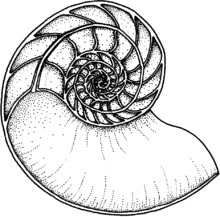This article needs additional citations for verification. (December 2008) |

The siphuncle is a strand of tissue passing longitudinally through the shell of a cephalopod mollusk. Only cephalopods with chambered shells have siphuncles, such as the extinct ammonites and belemnites, and the living nautiluses, cuttlefish, and Spirula. In the case of the cuttlefish, the siphuncle is indistinct and connects all the small chambers of that animal's highly modified shell; in the other cephalopods it is thread-like and passes through small openings in the septa (walls) dividing the camerae (chambers). Some older studies have used the term siphon for the siphuncle, though this naming convention is uncommon in modern studies to prevent confusion with a mollusc organ of the same name.[1]
- ^ Flower, Rousseau H. (1964). "Nautiloid shell morphology" (PDF). New Mexico Bureau of Mines and Mineral Resources, Memoir. 13: 1–78.